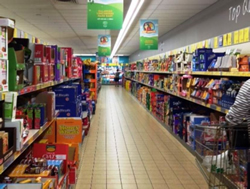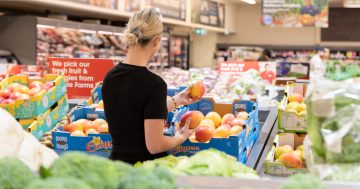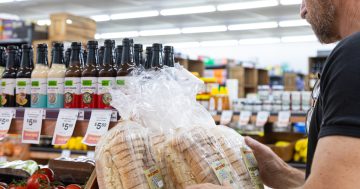Stephanie Nuzzo* says shopping around could provide big pay off as cost of living soars.
 If there’s one thing (aside from COVID) that has been on the collective minds of Australians of late, it’s the cost of living.
If there’s one thing (aside from COVID) that has been on the collective minds of Australians of late, it’s the cost of living.
Every day prices have been rising and folks have been struggling to wear the costs of ridiculously expensive groceries, petrol and beyond.
And while this issue is not one that will be disappearing anytime soon, there are ways we can side-step certain price jumps and save some cash.
One example is purchasing groceries from somewhere other than your usual supermarket.
ALDI recently released a price report for 2022 (with research by PwC and YouGov) stating that there was a price gap of 15.6 per cent between the cheapest products available at ALDI and other major supermarket competitors.
If you compare equivalent brands (rather than simply the cheapest products in-store) the pricing gap widened to 24.7 per cent.
Looking at specific types of food, ALDI shared that data indicated it came in at 18 per cent less for fresh meat and fish and bakery products were 15 per cent cheaper.
Chilled food items had the biggest gap at 20 per cent less, with pet food/products and fruit and vegetables following closely at 18 per cent cheaper.
Broken down, ALDI reported that families shopping with them could potentially save from $1,555 (comparing cheapest items) to $2,468 (comparing equivalent brands) each year on groceries.
Moving across to a more boutique option for fresh fruit and veg, Good & Fugly, founder Richard Tourino shared with us that “We’ve been able to ride out the spikes in prices so far because we have control of what we put in our seasonal boxes”.
Tourino explained over email that, unlike many supermarkets, Good & Fugly – which distributes boxes of fresh ‘fugly’ otherwise wasted produce – has not increased its prices.
[Full disclosure, I personally subscribe to Good & Fugly, and can confirm that yeah, prices haven’t changed.]
“First of all, the produce is all in season, which means it costs less than purchasing out of season which is kind of encouraged by the supermarkets.
“Also, most of our produce is local which means they’re not as badly affected by transport cost hikes.
“Finally, because of our relationships with growers, who we pay a fair price for fuglies, we don’t see the massive fluctuations in prices you see for non-fuglies,” he said.
As ALDI’s report highlighted, all these details matter more than ever before right now with Aussies indicating they are thinking about saving money far more often.
In a statement on the report, ALDI shared that “price is now the single most important factor in the weekly grocery shop (45 per cent) with half of Australians taking greater consideration of price in the last year (49 per cent)”.
Additionally, it shared that petrol and groceries were the top two areas that are bringing Aussies concern in terms of affordability.
“Nearly all (98 per cent) Aussie grocery shoppers have noticed an increase in the overall cost of items compared to previous years, with over four in five (81 per cent) Aussie grocery shoppers concerned about the affordability of living costs in the next year,” ALDI stated.
With that considered, it’s unsurprising to see ALDI share that “Almost four in five (78 per cent) Aussie grocery shoppers have reduced their purchases in the last year, with restaurants/takeaways (44 per cent) and meat (39 per cent) being the most likely to have been reduced”.
If you’re looking for advice on ways to cut costs when shopping for groceries, Tourino has three simple tips:
- Shop around to find the best prices.
- Buy seasonal fruit and veg.
- Replace some meat meals with more fruit and veg, and eggs for protein.
Shopping well saves more than money
While we know that Aussies are concerned about finances right now, there are more benefits to shifting your approach to grocery shopping than lower bills.
If you followed the recent story of about $200,000 worth of avocadoes being tossed into a tip, you’ll know that rising costs and the pressure for farmers to produce ‘high-quality’ fruit and vegetables are leading to excessive waste.
“Basically a grower has determined with all the costs of picking, packing and distribution to market whether that fruit was going to sell, whether they had a market for it,” a spokesperson for Avocados Australia told the Cairns Post.
By shopping for less-than-perfect-looking fruit and veg, you’re helping to stop things like this from happening… while saving yourself some coin.
Tourino explained it this way:
“…you’re helping farmers by providing them with another revenue stream that they didn’t have before.
Instead of farmers having to dump perfectly delicious produce because supermarkets think there’s something wrong with them – because of a little scratch – farmers are able to recoup, and make a return on the money and effort they spent growing that ‘imperfect’ produce!
“More broadly, by showing supermarkets that you’re happy buying seasonal and fugly produce, over time this will encourage them to change their ways and stop rejecting up to 25 per cent of farmers’ perfectly good produce.
“Farmers win, consumers win and the planet does, too.”
So, long story short – it’s pretty clear there are some savings to be made by switching up your approach to shopping for groceries.
If you’re after more tips, check out our recipes using cheap ingredients like silverside and potatoes.
Take a look at ALDI’s Super Savers deals and Good & Fugly’s subscription options to learn more.
*Stephanie Nuzzo is the editor of Lifehacker Australia.
This article first appeared at lifehacker.com.au.










